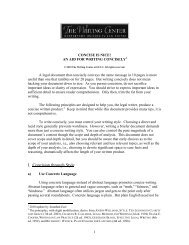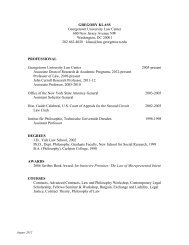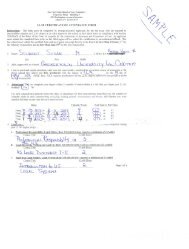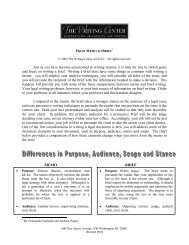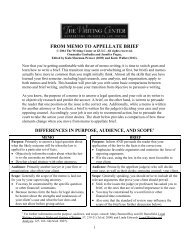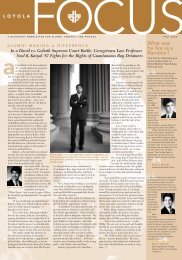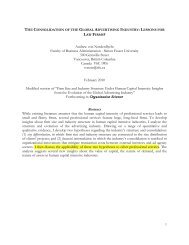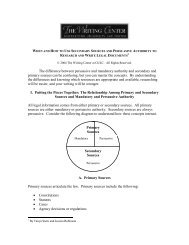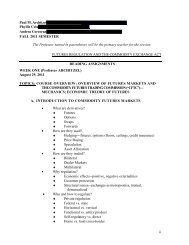Date: April 12, 2013 Topic: The Shrinking ... - Georgetown Law
Date: April 12, 2013 Topic: The Shrinking ... - Georgetown Law
Date: April 12, 2013 Topic: The Shrinking ... - Georgetown Law
You also want an ePaper? Increase the reach of your titles
YUMPU automatically turns print PDFs into web optimized ePapers that Google loves.
General Counsel with Power? 2011 <br />
sort of panel mentality, although occasionally, we might put a few of them in competition’ (revealing a <br />
distaste for (d) in the panel characteristics above). Thus, the five ‘chosen partners’ are typically not <br />
asked to tender, but are allocated legal work in non-‐compete areas. <br />
One respondent defined a panel succinctly as ‘a group of interchangeable suppliers with whom you have <br />
preferential supply terms.’ Evident in this definition is the inherent tension between competition and <br />
collaboration. <strong>The</strong>re are three mechanisms in use – convergence, online bidding, and legal networks – <br />
to navigate this tension. A different mix of these mechanisms gives rise to differential incentives for law <br />
firms, as elaborated below. <br />
Convergence <br />
An overwhelming majority of general counsel in this study noted a recent trend towards reducing the <br />
number of law firms the company instructs. In the last five to ten years, drastic ‘culling’ occurred at <br />
some firms (see Table 3). (At the other extreme, one global manufacturing company continued to have <br />
as many as 170 law firms on its practice-‐based panels put together). <br />
Table 3: Number of <strong>Law</strong> Firms on the Panel <br />
Five years ago <br />
Now (2010) <br />
Case I 55 14 <br />
Case II 60 6 <br />
Case III 38 26 <br />
Case IV 49 9 <br />
Case V 70 20 <br />
Source: Author’s interviews. <br />
<strong>The</strong> general counsel saw obvious advantages in giving larger chunks of legal work to a smaller number of <br />
law firms. For example, a financial institution has 15 law firms on a global panel, which includes three <br />
magic circle firms. Its general counsel echoed many others interviewed in noting three key benefits of <br />
having a panel, namely (a) deeper relationship with panel firms arising from focus, (b) discounted fees <br />
for volume work, and (c) ‘freebies’ such as secondees, free advice, seminars and training, and the <br />
allocation of good partners and associates for the bank’s legal work. Hence, the panel is a good <br />
mechanism for enhancing corporations’ bargaining power vis-‐à-‐vis law firms. <br />
Despite these obvious benefits, a minority of general counsel are not convergence fans. <strong>The</strong>re are three <br />
problems, in their views. First, there is the problem of diminished local autonomy: convergence <br />
requires centralized legal department control, and some GCs felt it politically impossible to take power <br />
away from in-‐house lawyers in divisions and regions. Second, there is the problem of inefficiency: ‘firms <br />
that have converged have focused that work on a number of large law firms, and we have found the <br />
larger law firms to be what we consider the more inefficient of the bunch’, according to a US energy firm <br />
GC. Mid-‐tier law firms are less costly and often have better connections with local counsel. Third, there <br />
10 <br />
Said Business School | University of Oxford



